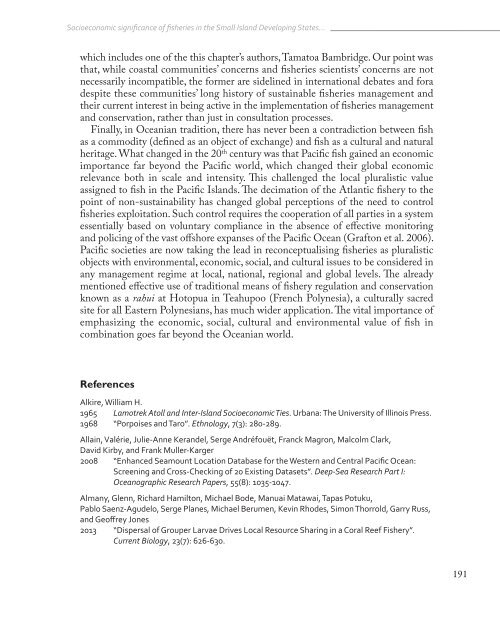Fisheries in the Pacific
Fisheries_in_the_Pacific
Fisheries_in_the_Pacific
You also want an ePaper? Increase the reach of your titles
YUMPU automatically turns print PDFs into web optimized ePapers that Google loves.
Socioeconomic significance of fisheries <strong>in</strong> <strong>the</strong> Small Island Develop<strong>in</strong>g States…<br />
which <strong>in</strong>cludes one of <strong>the</strong> this chapter’s authors, Tamatoa Bambridge. Our po<strong>in</strong>t was<br />
that, while coastal communities’ concerns and fisheries scientists’ concerns are not<br />
necessarily <strong>in</strong>compatible, <strong>the</strong> former are sidel<strong>in</strong>ed <strong>in</strong> <strong>in</strong>ternational debates and fora<br />
despite <strong>the</strong>se communities’ long history of susta<strong>in</strong>able fisheries management and<br />
<strong>the</strong>ir current <strong>in</strong>terest <strong>in</strong> be<strong>in</strong>g active <strong>in</strong> <strong>the</strong> implementation of fisheries management<br />
and conservation, ra<strong>the</strong>r than just <strong>in</strong> consultation processes.<br />
F<strong>in</strong>ally, <strong>in</strong> Oceanian tradition, <strong>the</strong>re has never been a contradiction between fish<br />
as a commodity (def<strong>in</strong>ed as an object of exchange) and fish as a cultural and natural<br />
heritage. What changed <strong>in</strong> <strong>the</strong> 20 th century was that <strong>Pacific</strong> fish ga<strong>in</strong>ed an economic<br />
importance far beyond <strong>the</strong> <strong>Pacific</strong> world, which changed <strong>the</strong>ir global economic<br />
relevance both <strong>in</strong> scale and <strong>in</strong>tensity. This challenged <strong>the</strong> local pluralistic value<br />
assigned to fish <strong>in</strong> <strong>the</strong> <strong>Pacific</strong> Islands. The decimation of <strong>the</strong> Atlantic fishery to <strong>the</strong><br />
po<strong>in</strong>t of non-susta<strong>in</strong>ability has changed global perceptions of <strong>the</strong> need to control<br />
fisheries exploitation. Such control requires <strong>the</strong> cooperation of all parties <strong>in</strong> a system<br />
essentially based on voluntary compliance <strong>in</strong> <strong>the</strong> absence of effective monitor<strong>in</strong>g<br />
and polic<strong>in</strong>g of <strong>the</strong> vast offshore expanses of <strong>the</strong> <strong>Pacific</strong> Ocean (Grafton et al. 2006).<br />
<strong>Pacific</strong> societies are now tak<strong>in</strong>g <strong>the</strong> lead <strong>in</strong> reconceptualis<strong>in</strong>g fisheries as pluralistic<br />
objects with environmental, economic, social, and cultural issues to be considered <strong>in</strong><br />
any management regime at local, national, regional and global levels. The already<br />
mentioned effective use of traditional means of fishery regulation and conservation<br />
known as a rahui at Hotopua <strong>in</strong> Teahupoo (French Polynesia), a culturally sacred<br />
site for all Eastern Polynesians, has much wider application. The vital importance of<br />
emphasiz<strong>in</strong>g <strong>the</strong> economic, social, cultural and environmental value of fish <strong>in</strong><br />
comb<strong>in</strong>ation goes far beyond <strong>the</strong> Oceanian world.<br />
References<br />
Alkire, William H.<br />
1965 Lamotrek Atoll and Inter-Island Socioeconomic Ties. Urbana: The University of Ill<strong>in</strong>ois Press.<br />
1968 “Porpoises and Taro”. Ethnology, 7(3): 280-289.<br />
Alla<strong>in</strong>, Valérie, Julie-Anne Kerandel, Serge Andréfouët, Franck Magron, Malcolm Clark,<br />
David Kirby, and Frank Muller-Karger<br />
2008 “Enhanced Seamount Location Database for <strong>the</strong> Western and Central <strong>Pacific</strong> Ocean:<br />
Screen<strong>in</strong>g and Cross-Check<strong>in</strong>g of 20 Exist<strong>in</strong>g Datasets”. Deep-Sea Research Part I:<br />
Oceanographic Research Papers, 55(8): 1035-1047.<br />
Almany, Glenn, Richard Hamilton, Michael Bode, Manuai Matawai, Tapas Potuku,<br />
Pablo Saenz-Agudelo, Serge Planes, Michael Berumen, Kev<strong>in</strong> Rhodes, Simon Thorrold, Garry Russ,<br />
and Geoffrey Jones<br />
2013 “Dispersal of Grouper Larvae Drives Local Resource Shar<strong>in</strong>g <strong>in</strong> a Coral Reef Fishery”.<br />
Current Biology, 23(7): 626-630.<br />
191


